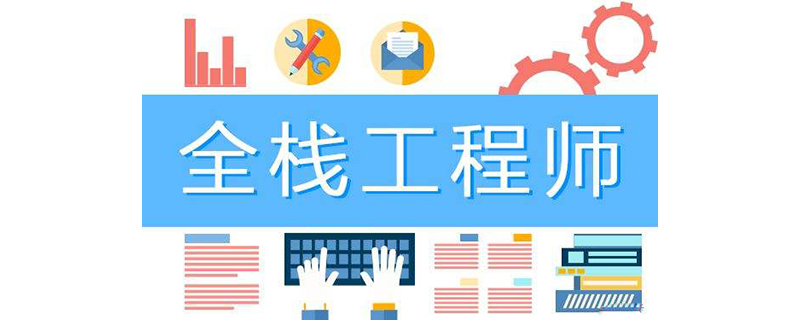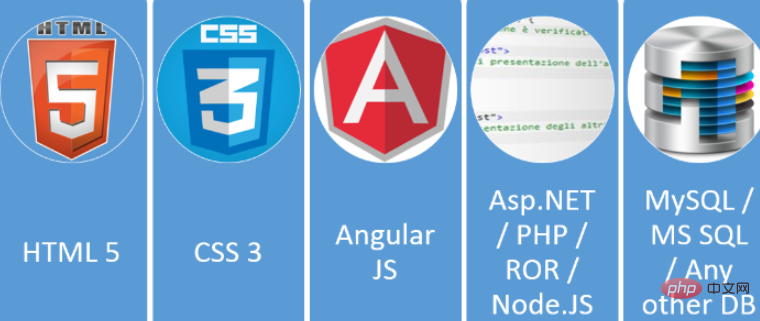Home > Article > Backend Development > What is a full stack engineer?

#1. What is a full stack developer?
In short, a full-stack developer is a person who masters a variety of skills and uses these skills to complete a product independently.
A full-stack developer is an engineer who can handle everything from databases, servers, system engineering, and clients. Depending on the project, what the customer needs may be a mobile stack, a web stack, or a native application stack.
In fact, "full stack" refers to the collection of a series of technologies required to complete a project. "Stack" refers to a collection of submodules. These software sub-modules or components are combined to achieve a given function without the need for other modules.
2. Why are full-stack developers controversial?
As mentioned above, the discussion about full-stack developers is really a debate about skill depth and breadth.
Advantages: A full stack developer is involved in horizontal technical requirements so he/she can quickly prototype the product using various technologies. With full stackability, they allow for a broader perspective and a more positive mindset. Moreover, they are more sensitive to technology and products. Therefore, this kind of people can always have their own opinions on products or designs.
On the other hand, he/she can provide help to everyone in the team and greatly reduce the time and technical costs of team communication, technical docking. Many of them become startups or technology partners for startups.
Disadvantages: It is precisely because of the development of horizontal technology that some full stack developers cannot become experts in a skill. Most people who claim to be "full-stack developers" only have an understanding of a variety of skills. As for how to make the architecture more suitable for modular development, this is a question.
How to become a full stack engineer?
A qualified full-stack engineer should have functional knowledge and functionality of all aspects involved in building an application.
1) Programming language

You need to be proficient in multiple programming languages, such as JAVA, PHP, C#, Python, Ruby, Perl, etc. Because most core business processes need to be written in these languages. Not all may be needed. But you must also master language syntax and be very familiar with how to structure, design, implement and test projects based on one or more languages. For example, if you choose JAVA, then you need to master object-oriented design and development, design patterns, J2EE-based development components, etc.
2) Use development frameworks and third-party libraries
Popular development languages are usually accompanied by a good development framework, such as JAVA Spring, MyBatis, Hibernate, Python Django , PHP thinkphp, yin, nodeJs express, etc.
3) Front-end technology
In today’s projects and product development, front-end technology is becoming more and more important. In addition to product functions, user experience is also one of the criteria for testing product success rate. All of these depend on the implementation of front-end technology, which requires mastering some basic front-end technologies, such as HTML5, CSS3, JavaScript, and further research on front-end frameworks or third-party libraries, such as JQuery, LESS, SASS, AngularJS or REACT.
4) Database and cache
Any product or project requires a database to store data. As a full stack developer, you also need to have at least one or two databases and know how to interact with databases. Currently, popular databases are MySQL, MongoDB, Redis, Oracle, SQLServer, etc. As a document type database, MongoDB is more widely used in Internet products. For larger projects, Ialso recommends using MySQL or commercial Oracle as the backend database. And in-memory databases (such as Redis) can be used for caching to improve system performance.
5) Basic Design Capabilities
Most articles or discussions about full stack developers are rarely related to design requirements. But I think design skills are very important, and you also need to understand the principles and techniques of basic prototyping, UI design, and UX design.
6) Self-requirements are also an important factor in becoming a full stack developer:
1. Global thinking
2. Good communication skills
3.Creativity
4.Curiosity
5.Time management skills
In short, full stack engineering is not accomplished overnight. What you need to do is lay a technical foundation, strengthen core skills, and continue to learn more challenges.
The above is the detailed content of What is a full stack engineer?. For more information, please follow other related articles on the PHP Chinese website!